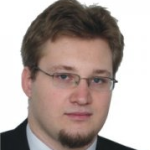
Research
Budapest University of Technology and Economics
Faculty of Electrical Engineering and Informatics
Semiconductor laboratory
CAD software • Circuit design • Clean room • Consultation • Custom chip packaging • Thermal analysos • Training

A kutatócsoport tagjai:

Plesz Balázs
associate professor
Description
Class 1000 (ISO 6) and Class 10000 (ISO 7) clean room laboratory with 2-3 inch silicon wafer technology for the design of diodes, MOS circuits, sensors, advanced devices, microfluidics and solar cell structures. Available technology steps: Photolithography (1 um resolution, double-sided interfacing), wet chemistry (purification, isotropic and anisotropic etching), surface treatment (O2, N2, Ar plasma), high temperature processes (oxidation, dopant diffusion, thermal treatment), vacuum evaporation (Al, Au, Ag, Ni, Ti, Cu), RF sputtering (Pt, Pd, Ti, V, Ta, Al, Cu, Ag, Mo, Fe, Ni, SnO2, ZnO, Si, SiC, Sn-In, SiO2, Si3N4, Al2O3), centrifugal deposition (SiO2, PDMS, SU-8), screen printing (Al, Ag). The laboratory is also equipped with instruments for the qualification of the samples and devices produced: optical microscopes, SEM, mechanical profilometers, spreading resistance measurements, SPV and resonant capacitor surface potential mapping, CV measurements, as well as project specific custom measurement setups such as solar cell qualification systems (I-V and SR).Services offered
The services offered by the laboratory are as follows:- Clean room services
- Custom chip packaging and bonding
- Thermal testing of semiconductor devices
- Combined thermal and radiometric/photometric measurement of LED tokens
- IC, MEMS, Lab-on-a-Chip, FPGA, PCB design consulting and mentoring
- Digital and analog circuit (IC) design
- Measurement and consulting on reliability issues of electronic/electronic systems
- Training in the application of CAD systems, CAE software
